Protein Supplements: Do you really need them?
LiveNutrition
2/8/20253 min read


Protein supplements are designed to aid muscle recovery, support muscle growth, and enhance overall athletic performance. They offer a convenient way to increase protein intake, especially for individuals with higher protein requirements due to intense physical activity.
Types of Protein:
Whey Protein: Derived from milk, whey protein contains all essential amino acids and is quickly absorbed, making it ideal for post-workout recovery.
Casein Protein: Also milk-derived, casein is absorbed more slowly, providing a sustained release of amino acids, which can be beneficial before periods of fasting, such as overnight.
Plant-Based Proteins: Sources like soy, pea, hemp, and rice protein are suitable for those following vegetarian or vegan diets. It’s important to combine different plant proteins to ensure a complete amino acid profile.
Recommended Intake: The Recommended Dietary Allowance (RDA) for protein is 0.8 grams per kilogram of body weight for sedentary adults. However, athletes may benefit from higher intakes, typically ranging from 1.2 to 2.0 grams per kilogram, depending on the intensity and type of exercise.


Amino Acid Supplements:
Branched-Chain Amino Acids (BCAAs): Comprising leucine, isoleucine, and valine, BCAAs are believed to support muscle protein synthesis and reduce exercise-induced muscle breakdown. However, research indicates that BCAA supplementation alone may not significantly enhance muscle growth compared to adequate protein intake from whole foods.
Essential Amino Acids (EAAs): These are amino acids that the body cannot synthesize and must be obtained through diet. EAA supplements can be beneficial, especially when dietary protein intake is insufficient.
Safety and Efficacy: Amino acid supplements are generally safe for healthy adults when consumed within recommended dosages. Potential side effects may include digestive discomfort or headaches. It’s crucial to consult with a healthcare professional before starting any new supplement regimen, particularly for individuals with existing health conditions or those taking medications.
Considerations:
Quality Assurance: Choose supplements that have been third-party tested for purity and potency to ensure they are free from contaminants and accurately labeled.
Whole Foods vs. Supplements: While supplements can be convenient, obtaining protein and amino acids from whole food sources is preferable due to the additional nutrients they provide. Supplements should complement, not replace, a balanced diet.
Individual Needs: Nutritional requirements vary based on factors such as age, gender, body composition, and activity level. Personalized recommendations from a qualified nutritionist or dietitian can help optimize performance and health outcomes.
In summary, protein and amino acid supplements can be beneficial tools for supporting athletic performance and recovery when used appropriately. Emphasis should be placed on meeting nutritional needs through a balanced diet, with supplements serving as an adjunct when necessary.


Overconsumption Risks:
Many fitness supplements (pre-workouts, energy drinks, hydration powders) contain isolated or partially chained amino acids. When combined with protein powders or high-protein diets, this can lead to excessive intake.
The body has a limit to how much protein it can effectively use for muscle synthesis; excess is either converted to energy or, in extreme cases, can strain the kidneys and liver.
Imbalance of Amino Acids:
Some supplements contain non-essential amino acids in high quantities, which may not provide additional benefits.
If amino acids are not present in the right ratios (especially essential ones), they may not form complete proteins necessary for optimal muscle repair and growth.
Digestive and Metabolic Strain:
Excess amino acids that are not utilized can lead to nitrogen buildup, which the kidneys must filter out.
Some people experience digestive discomfort (bloating, gas, diarrhea) from excessive protein intake.
Best Practices for Safe Supplement Use:
Track Total Protein Intake – Factor in whole foods, shakes, and other supplements to avoid excess.
Prioritize Whole Foods – Lean meats, fish, eggs, dairy, legumes, and nuts provide naturally balanced amino acids.
Use Supplements to Fill Gaps – Instead of relying on them as the primary source, use them to complement your diet.
Choose High-Quality Supplements – Look for third-party-tested products without unnecessary additives.
Stay Hydrated – High protein intake increases water needs to support kidney function.


Empowering you to control your food choices.
© 2025. LiveNutrition. All rights reserved.

